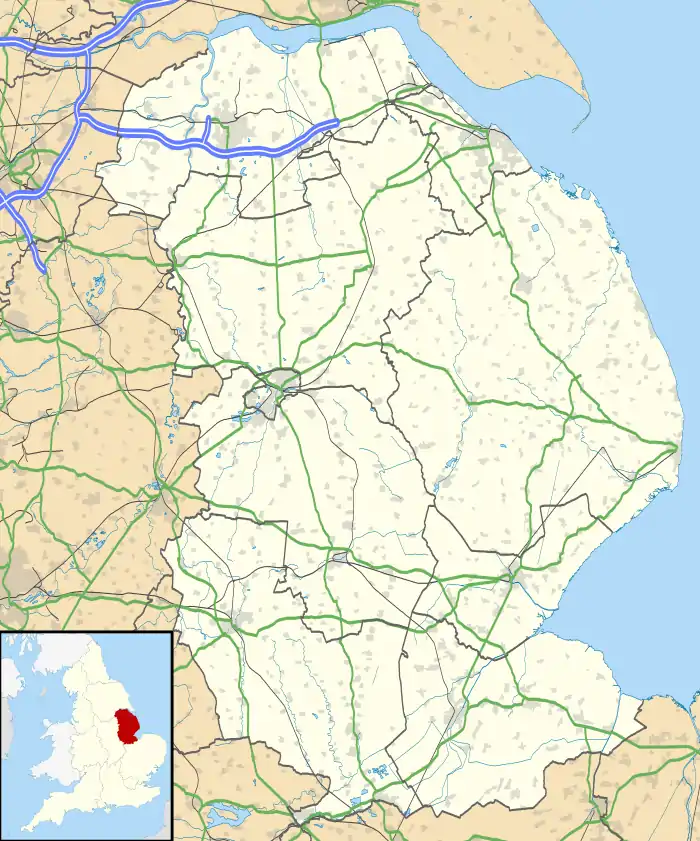| Lincoln City Hall | |
|---|---|
 Lincoln City Hall | |
| Location | Beaumont Fee, Lincoln |
| Coordinates | 53°13′52″N 0°32′37″W / 53.2310°N 0.5437°W |
| Built | 1973 |
| Architect | John Roberts Associates |
| Architectural style(s) | Brutalist style |
 Shown in Lincolnshire | |
City Hall is a municipal structure on Beaumont Fee, Lincoln, Lincolnshire, England. The structure is currently used as the headquarters of the City of Lincoln Council.
History

The first municipal building in Lincoln was the guildhall which, in its present incarnation in Saltergate, was completed in 1520.[1] The council outgrew the limited office space at the guildhall and from the 1890s had its main offices in a nearby building called Corporation Offices on Silver Street, with the guildhall thereafter being used for meetings and the mayor's parlour.[2][3]
The current building between Beaumont Fee and Orchard Street was commissioned as a speculative office block.[4] The site was occupied by the Roman Lower West Gate and the planning authority required that the remains be preserved and protected underneath the new building.[5][6][7]
The new building was designed by John Roberts Associates in the Brutalist style, built in concrete and glass and was completed in spring 1973.[8][9] The design involved a main frontage of 14 bays facing Orchard Street with another long wing extending eastwards behind the left-hand end of the Orchard Street elevation. The main frontage was faced with alternating bands of concrete and dark-framed windows. The fifth and sixth bays from the left featured deeply recessed openings on the ground floor with a glass balcony above bearing the city coat of arms.[10] The design was strongly criticised by the architectural historian, Nikolaus Pevsner, who said it had "absolutely nothing to recommend it ... it offends the Lincoln skyline and is an insult to the civic pride befitting the seat of local government."[11]
The increasing responsibilities of the council meant that, by the early 1970s, some of its functions were being carried out at remote locations and there was pressure to collocate all departments under one roof. The council therefore acquired the Beaumont Fee building to replace the corporation offices on Silver Street and other outlying departments. Full council meetings continued to be held in the guildhall.[12] The building was formally opened as the council's headquarters on 16 March 1974.[13] The corporation offices were subsequently demolished and the Stonebow shopping centre built on the site.[3]
In February 2015, it was announced that the Orchard Street wing would be leased to the Department for Work and Pensions so that the local job centre could move into the building so forming a "public sector hub".[14] The works, which were undertaken at a cost of £1.4 million, were completed and the wing re-opened in January 2016.[15]
References
- ↑ Pevsner, Nikolaus; Harris, John; Antram, Nicholas (1989). Lincolnshire (Buildings of England Series). Yale University Press. p. 503. ISBN 978-0300096200.
- ↑ "No. 45918". The London Gazette. 27 February 1973. p. 2716.
- 1 2 "Travel back in time again on Silver Street to see what was here before The Stonebow Centre". Light and Dreams Photography. YouTube. Retrieved 27 November 2023.
- ↑ Lincolnshire History and Archaeology Issues 24–27. Lincolnshire Local History Society. 1989. p. 62. Retrieved 31 August 2022.
- ↑ Historic England. "Roman wall, ditch and gate adjoining and under The Park (1004986)". National Heritage List for England. Retrieved 31 August 2022.
- ↑ Morris, M. (1 September 1995). "City Hall, Beaumont Fee: Archaeological Watching Brief" (PDF). The City of Lincoln Archaeology Unit. Retrieved 31 August 2022.
- ↑ "Lincolnshire History and Archaeology Issues 31–32". Lincolnshire Local History Society. 1996. p. 55. Retrieved 31 August 2022.
- ↑ "A Timeline of Lincoln History". Local Histories. Archived from the original on 20 July 2017. Retrieved 31 August 2022.
- ↑ "No. 46000". The London Gazette. 8 June 1973. p. 7179.
- ↑ "Lincoln Townscape Assessment Orchard Street Inherited Character Area Statement" (PDF). City of Lincoln Council. 1 June 2009. p. 6. Retrieved 31 August 2022.
- ↑ Pevsner et al 1989, p. 441
- ↑ "Famous Lincoln landmark wins prestigious award". Lincolnshire Live. 29 March 2019. Retrieved 31 August 2022.
- ↑ "City Hall opened - and relic saved". Lincolnshire Echo. Lincoln. 18 March 1974. p. 7. Retrieved 26 November 2023.
- ↑ "Lincoln City Hall works approved as Jobcentre prepares to move in". The Lincolnite. 23 February 2015. Retrieved 14 November 2020.
- ↑ "Doors open to £1.4m Lincoln Public Services Hub, biggest in the country". The Lincolnite. 27 January 2016. Retrieved 31 August 2022.